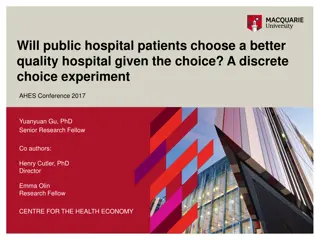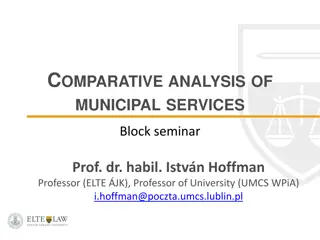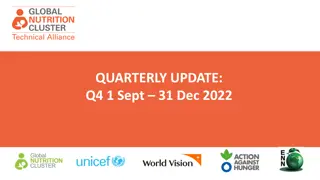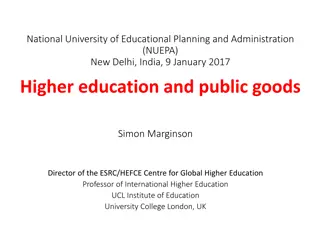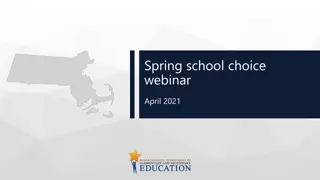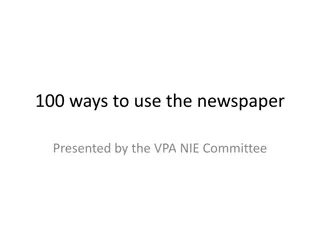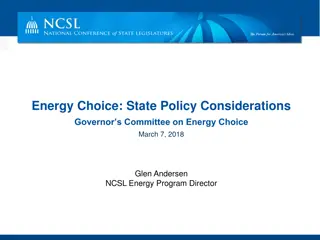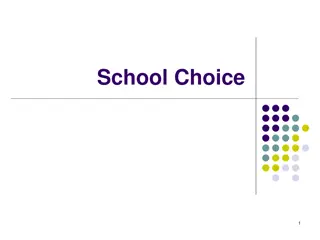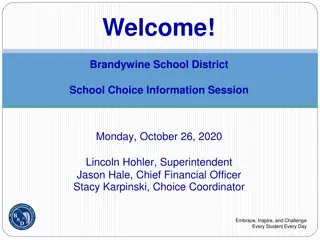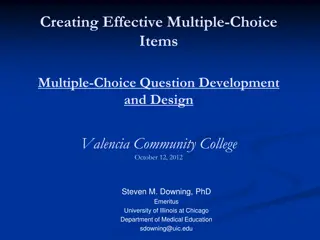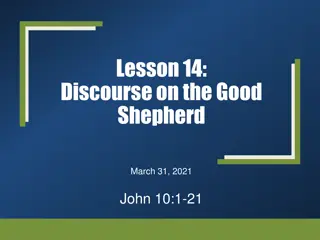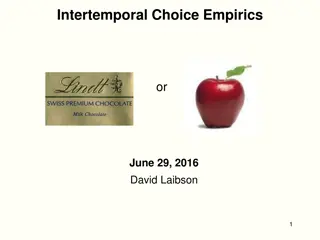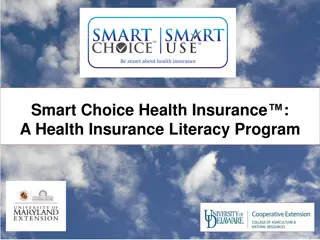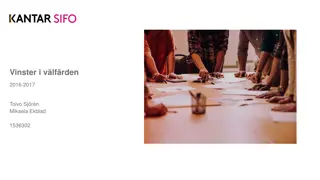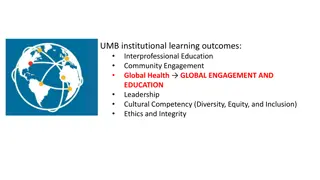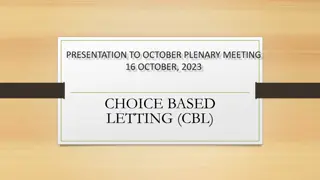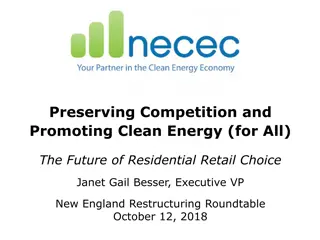
Understanding Public Choice and New Institutional Economics
Dive into the world of public choice and new institutional economics with a focus on the general assumptions, the Virginia School of Political Economy, and society's rejection of the organic conception of the state. Explore key figures like James Buchanan and Gordon Tullock, along with the implications of game theory on democratic systems.
Download Presentation

Please find below an Image/Link to download the presentation.
The content on the website is provided AS IS for your information and personal use only. It may not be sold, licensed, or shared on other websites without obtaining consent from the author. If you encounter any issues during the download, it is possible that the publisher has removed the file from their server.
You are allowed to download the files provided on this website for personal or commercial use, subject to the condition that they are used lawfully. All files are the property of their respective owners.
The content on the website is provided AS IS for your information and personal use only. It may not be sold, licensed, or shared on other websites without obtaining consent from the author.
E N D
Presentation Transcript
Public Choice and New Institutional Economics CRAIG VINCENT MITCHELL, PHD ASSOCIATE PROFESSOR OF CHRISTIAN ETHICS
Political Economics Political Economics New Public Choice Institutional Economics
General Assumptions Politics can be evaluated by neo-classical economics Humans are rational People have preferences that are stable Actors can perceive the world accurately All economic agents have full information
Public Choice James Buchanan Gordon Tullock
Public Choice The Virginia School of Political Economy is a term applied to a school of economic thought originating in universities of Virginia and mainly focusing on public choice theory, constitutional economics, and law and economics. Buchanan and Gordon Tullock wrote The Calculus of Consent: Logical Foundations of Constitutional Democracy (1962). The Virginia approach is also favored by some economists of the Chicago and Austrian schools. Virginia School economists are often seen as 'fellow travelers' with Austrian economists, as members of both schools of economic thought generally favor free-market outcomes.
Public Choice Virginia School Of Political Economy Constitutional Economics Law and Economics Public Choice
Public Choice Virginia School Of Political Economy George Mason University Virginia Tech University of Virginia (1957) (1969) (1983)
Public Choice Society Rejection of organic conception of the state and societal will. There is no public good only many individual goods. Society s actions are based on many individual decisions in a democratic process Methodological Individualism Motivation People are not motivated differently in the public domain Politicians are power maximizing because they participate in a zero-sum game Assumptions Game Theory Participants in markets are utility maximizing because it is a non- zero sum game with Nash equilibriums. It is impossible to arrive at efficient and optimal outcomes in a democratic system, because while individuals are rational, groups are not. Arrow s Impossibility Theorem
Public Choice Level Motivation Are utility maximizing, consequently, they are also vote maximizing Problem Asymmetrical information may lead them to act in ways that are contrary to the electorate Asymmetrical information may lead them to act in ways that are contrary to the electorate Each individual has a desire for a different mix of public goods Theory Median voter theory Politicians Anthony Downs Are utility maximizing, consequently, they are also budget maximizing Government bureaus should compete with one another Bureaucrats William Niskanen Are utility maximizing Rent seeking Voters James M. Buchanan and Gordon Tullock Log- rolling
Public Choice Asymmetrical Information: Voters and Politicians Agents Guileless Politician Deceitful Politician Social optimum Best case scenario Adverse Selection Politician takes advantage of his situation Alert Voters Principal Less than optimal Worst case scenario (corruption) Adverse selection and Moral hazard Careless Voters
Public Choice Asymmetrical Information: Politicians and Bureaucrats Agent Honest Bureaucrat Dishonest Bureaucrat Social Optimum Adverse Selection Alert Politician Best case Scenario Corruption Principal Adverse Selection and Moral hazard Less than optimal situation Careless Politician Worst Case Scenario
Public Choice The Logic of Collective Action: Public Goods and the Theory of Groups (1965 Olson theorized that only a separate and selective incentive will stimulate a rational individual in a latent group to act in a group- oriented way ; that is, members of a large group will not act in the group's common interest unless motivated by personal gains (economic, social, etc.). He concluded that only small groups can act simply on a shared objective. Large groups, however, will not form or work towards a shared objective unless individual members are sufficiently motivated. Mancur Olson
Public Choice Charles Tiebout Vincent Ostrom
Public Choice Ostrom co-developed with Charles Tiebout the concept of polycentricity in public administration - or multiple, formally independent decision-making centers within a system of government. They proposed that quasi- market conditions (i.e. competition) between decision centers would increase flexibility and responsiveness. In contrast to hierarchical frameworks, polycentrism removes government from the focal point of ultimate knowledge and authority. The Intellectual Crisis in Public Administration (1973) Ostrom noted the breaking down of the intellectual foundation of public administration as formulated by Woodrow Wilson
New Public Management New Public Management is a public choice approach to public administration based on the work of Vincent Ostrom and Charles Tiebout. It resulted from the triumph of the global free market. It also resulted from the triumph of democracy and the rule of law over authoritarianism and statism. It was the dominant approach to public administration from 1980-2002.
New Public Management NPM Endorses NPM Rejects Normativity- has an explicitly normative model of public managers. Public Policy- accepts that reality that while public policy is the responsibility of politicians, civil servants do in fact make public policy Quality- continuous improvement (TQM) Command Control- results in an inefficient and unresponsive bureaucracy that fails to meet the needs of the client/ citizens Government Planners- Planners often do not take into account the needs and desires of their citizen/ clients
New Institutional Economics Ronald Coase Coase attended the London School of Economics, where he received a bachelor of commerce degree in 1932, and was a member of the staff from 1935 to 1951. He then started to work at the University at Buffalo and became an American citizen after moving to the United States in the 1950s. In 1958, he moved to the University of Virginia. Coase settled at the University of Chicago in 1964 and became the editor of the Journal of Law and Economics. He received the Nobel Prize in Economics in 1991.
New Institutional Economics Coase noted, however, a number of transaction costs involved in using the market; the cost of obtaining a good or service via the market actually exceeds the price of the good. Other costs, including search and information costs, bargaining costs, keeping trade secrets, and policing and enforcement costs, can all potentially add to the cost of procuring something from another party. This suggests that firms will arise which can internalise the production of goods and services required to deliver a product, thus avoiding these costs. This argument sets the stage for the later contributions by Oliver Williamson: markets and hierarchies are alternative coordination mechanisms for economic transactions.[
New Institutional Economics Oliver Williamson Douglass North
New Institutional Economics NIE is concerned with collective decision making. It is an economic perspective that attempts to extend economics by focusing on the social and legal norms and rules that underlie economic activity and with analysis beyond earlier institutional economics and neoclassical economics Douglass North views public choice as the part of NIE involved in organizational change
New Institutional Economics New Institutional Economics Morality Religion Politics Economics Law
New Institutional Economics NIE Institutions Organizations
Assumptions of NIE All transactions are voluntary in nature Perfect knowledge and zero transaction costs The role of government is limited to ensuring that the actors are able to pursue their interests- the invisible hand Efficiency allocation of resources and products is the natural outcome when individuals are allowed to pursue their interests
New Institutional Economics Institutions The rules of the game Formal legal rules Informal social norms Organizations Groups of people Governance arrangements Created to coordinate transactions
New Institutional Economics Transaction Costs Magnitude of such costs affects the way economic activity is organized and carried out Includes: search and information costs Transaction costs can affect formation of contracts Property Rights Allocation of property rights affects incentives on human behavior and economic outcomes Contractual Relations Theory addresses incentive and asymmetric information problems Agency theory (collective decision making) Relationa and incomplete contract theory
Assumptions of NIE Methodological individualism Social phenomenon is the result of individuals making decisions Maximizing utility subject to constraints established by the existing institutional structures Individual rationality Opportunistic behavior- self seeking with guile
New Institutional Economics Elinor Ostrom Institutional Analysis and Design helps integrate work undertaken by those interested in how institutions affect the incentives confronting individuals and their resultant behavior. The essential foundations of her system include: (1) frameworks, (2) theories, and (3) models.
New Institutional Economics She was awarded the 2009 Sveriges Riksbank Prize in Economic Sciences in Memory of Alfred Nobel, which she shared with Oliver E. Williamson, for "her analysis of economic governance, especially the commons". She was the first, and to date, the only woman to win the prize in this category. Her work was associated with the New Institutional Economics and the resurgence of political economy. Ostrom lived in Bloomington, Indiana, and served on the faculty of both Indiana University and Arizona State University. She held the rank of Distinguished Professor at Indiana University and was the Arthur F. Bentley Professor of Political Science and Co-Director of the Workshop in Political Theory and Policy Analysis at Indiana University in Bloomington, as well as Research Professor and the Founding Director of the Center for the Study of Institutional Diversity at Arizona State University in Tempe. She and her husband, Vincent Ostrom, advised the journal Transnational Corporations Review beginning in 2008
Conclusions Both public choice and NIE apply concepts from neoclassical economics to politics and public policy Public Choice originates from the Virginia School of Political Economy NIE originates from the Chicago School of Economics Public Choice is that part of NIE that is concerned with institutional change

